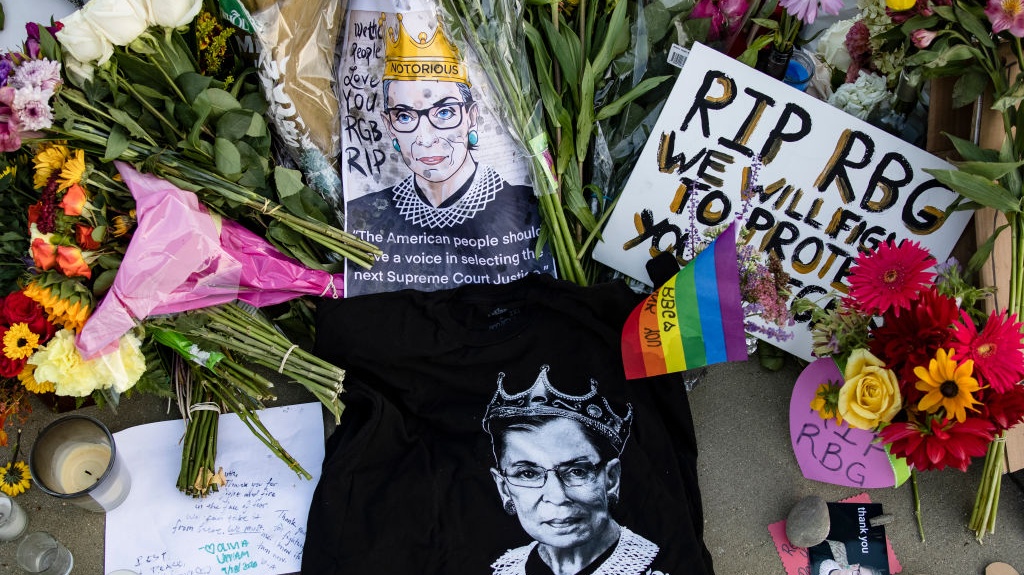Supreme Court Justice Ruth Bader Ginsburg, the Court’s oldest justice and a liberal and feminist icon, died Friday evening. Her death resulted from complications related to metastatic pancreas cancer, according to an official statement released by the Supreme Court. Justice Ginsburg was 87.
In the Court’s statement, Chief Justice John Roberts describes his colleague as “a jurist of historic stature”, a “cherished colleague” and “a tireless and resolute champion of justice.”
Ginsburg was born Joan Ruth Bader on March 15, 1933 in Brooklyn, New York. She graduated from Cornell University in 1954, marrying fellow student Martin Ginsburg later that year. She later attended Harvard Law School before transferring and graduating from Columbia Law School. After graduating, Ginsburg held professorships at Rutgers and later Columbia.
Ginsburg faced gender discrimination and hostility throughout her career. While at Harvard Law, for instance, the Dean once asked her and the eight other women students in the 500 person class how they “justif[ied] taking a spot from a qualified man?”
In response to the discrimination she and other women faced, Ginsburg devoted much of her professional life to fighting for gender equality. Ginsburg co-founded the Women's Rights Project of the American Civil Liberties Union (ACLU) in 1972. As the project’s general counsel, she personally argued six gender discrimination cases in front of the Supreme Court, winning five.
Ginsburg was appointed to the US Court of Appeals in 1980 and to the US Supreme Court in 1993. For years, she was the most consistent and high-profile liberal force on the Supreme Court. Some of her key rulings protected the rights of women and people with disabilities. Even when her opinion did not reflect the opinion of the majority, her written dissents were often influential. For instance, her dissent in the 2007 gender discrimination case Ledbetter v. Goodyear inspired the Lilly Ledbetter Fair Pay Act, the first piece of legislation that President Barack Obama signed into law after taking office in 2009.
Ginsburg also became a liberal and feminist icon, and perhaps an unlikely celebrity for young Americans. The diminutive Jewish grandmother was lovingly deemed “The Notorious RBG” online, and she became the subject of countless memes, as well as an opera, a 2018 Hollywood biopic, and a recurring portrayal on Saturday Night Live.
Condolences and tributes for Ginsburg and praise for her lifetime of work have been pouring out from political figures on both sides of the aisle.
Statement from the President on the Passing of Supreme Court Associate Justice Ruth Bader Ginsburg pic.twitter.com/N2YkGVWLoF
— Donald J. Trump (@realDonaldTrump) September 19, 2020
Ruth Bader Ginsburg stood for all of us. She was an American hero, a giant of legal doctrine, and a relentless voice in the pursuit of that highest American ideal: Equal Justice Under Law. May her memory be a blessing to all people who cherish our Constitution and its promise.
— Joe Biden (@JoeBiden) September 19, 2020
Tonight, we mourn the passing of a historic Justice and a legendary advocate. pic.twitter.com/2ZQ8eD9C3D
— Ted Cruz (@tedcruz) September 19, 2020
Tonight we mourn, we honor, and we pray for Justice Ruth Bader Ginsburg and her family. But we also recommit to fight for her legacy.
Doug and I send our heartfelt prayers to Jane and James, and the entire Ginsburg family, particularly on this holy day of Rosh Hashanah. pic.twitter.com/SNyqZCznfv
— Kamala Harris (@KamalaHarris) September 19, 2020
Ginsburg’s death sets up the stage for a potentially bitter Supreme Court battle. Shortly before her death, Ginsburg reportedly told her granddaughter that she did not want her replacement to be chosen until “a new president is installed,” a sentiment shared by most Democrats in Washington. A small number of moderate Republican Senators have signaled that they won’t vote on a replacement until after the November election, but it’s unclear whether they would wait until Trump left office if the President loses to Democratic challenger Joe Biden.
Nevertheless, within hours of the announcement of Ginsburg’s death, Senate Majority Leader Mitch McConnell announced that he would cooperate with President Trump in choosing a replacement justice, and that Trump’s nominee would receive a vote on the Senate floor, presumably before the end of the president’s current term.
This position is in stark contrast to McConnell’s approach to the last election-year Supreme Court opening, which was created when conservative Justice (and Ginsburg’s “best buddy”) Antonin Scalia died in February 2016. McConnell refused to allow a vote for President Obama’s nominee, Merrick Garland, arguing that the American people should be allowed to choose the next president before a nominee was considered. After President Trump took office in 2017, McConnell allowed a vote on Trump’s nominee, Neil Gorsuch, who was confirmed along mostly party lines.
Since then, the nomination process became even more partisan with the appointment of Trump nominee Brett Kavanaugh, who faced rape allegations and objections to what many saw as extreme conservative views. Kavanaugh was eventually confirmed with only two Senators voting across party lines. Trump’s appointments gave the Supreme Court a 5-4 conservative majority, and another Trump pick could solidify the Court’s conservative stance for years to come.
The ideological stakes of the next Supreme Court appointment, and McConnell’s apparent hypocrisy in his approach to Trump as compared to Obama, all set the stage for a bitter fight over Justice Ginsburg’s replacement.
Justice Ginsburg once said “fight for the things that you care about, but do it in a way that will lead others to join you.” Despite her own legacy of building bridges and convincing skeptics, the political fight over her replacement during an already-bitter election year is poised to further divide rather than unite the country.
